NBA Betting Guide For 2026
It may come as a surprise to some Brits, but basketball is one of the biggest sports in the world.
While it can’t come close to football, which dominates globally, in 2023 a study found that 3 out of 4 people in the 18 countries studied professed an interest in basketball, with a projected 3.3 billion fans worldwide.
Furthermore, worldwide interest in basketball had increased by an incredible 33% in the four years from 2019 to 2023, which is a pretty strong indication that global basketball’s popularity is on the rise.
Source: FIBA basketball consumer research study 2023
Of course, as this study was commissioned by the International Basketball Federation, you could reasonably assume that the data might have been interpreted with a degree of optimism.
Even so, it seems clear that basketball isn’t a solely American preoccupation by any means, and the presence of basketball markets on British bookie websites reflects that.
If you’re a sports bettor, or a matched bettor, you might well have thought about placing bets on basketball but refrained, perhaps feeling a little under-informed about the sport.
If so, we’re here to help! We’ll take you through everything you need to know about the sport to place bets with confidence, whether you’re sports betting recreationally or making profit through Matched Betting. So let’s get started!
A Short History Of Basketball
Basketball is a comparatively recent game when set aside sports like football or tennis, which have existed in some form for centuries.
Unlike many other sports, basketball’s invention can be traced to a specific person, place and time. In 1891, a Canadian physical education instructor by the name of James Naismith invented basketball in Springfield, Massachusetts.
He had been tasked with inventing a brand new game by his boss at the YMCA International Training School, with the following parameters: it should be an indoor game, to allow athletes to stay in shape over the frigid New England winters, and ‘fair for all players and not too rough’.
Basketball was the result, and its popularity was instant. Just two years later, the game had become so popular that the YMCA started promoting it internationally, and in 1904, only 13 years after its invention, it was a demonstration sport at the Olympics in Missouri.
There were, however, some fairly significant differences between the game when it was first conceived and the sport we know today.
Originally, peach baskets were used, which had a closed bottom - meaning the ball had to be manually retrieved each time a goal was scored. It wasn’t until 1906 that modern baskets, with open nets and a backboard, were introduced.
Basketball spread internationally quite organically, helped along by the US army during WWI, but its progress was considerably assisted by the formation of the International Basketball Federation (FIBA, which stands for Fédération Internationale de Basketball Amateur) in 1932, which helped to ensure the sport’s inclusion in the Olympic games of 1936 in Berlin.
In America, the NBA (National Basketball Association) was formed in 1949, and is now firmly established as the most significant professional basketball league in the world.
Although we think of basketball as an American sport, in truth it has been an international sport for the vast majority of its history.
However, the NBA is still the biggest and most profitable basketball league in the world, and consequently most bookies will focus almost exclusively on American basketball in the markets they offer.
NBA Leagues And Events
The National Basketball Association is made up of 30 teams - 29 of them American and one Canadian, meaning that it is technically ‘international’, despite its name.
The league is divided into eastern and western ‘conferences’ made up of fifteen teams each, and each conference consists of three regional divisions made up of five teams apiece.
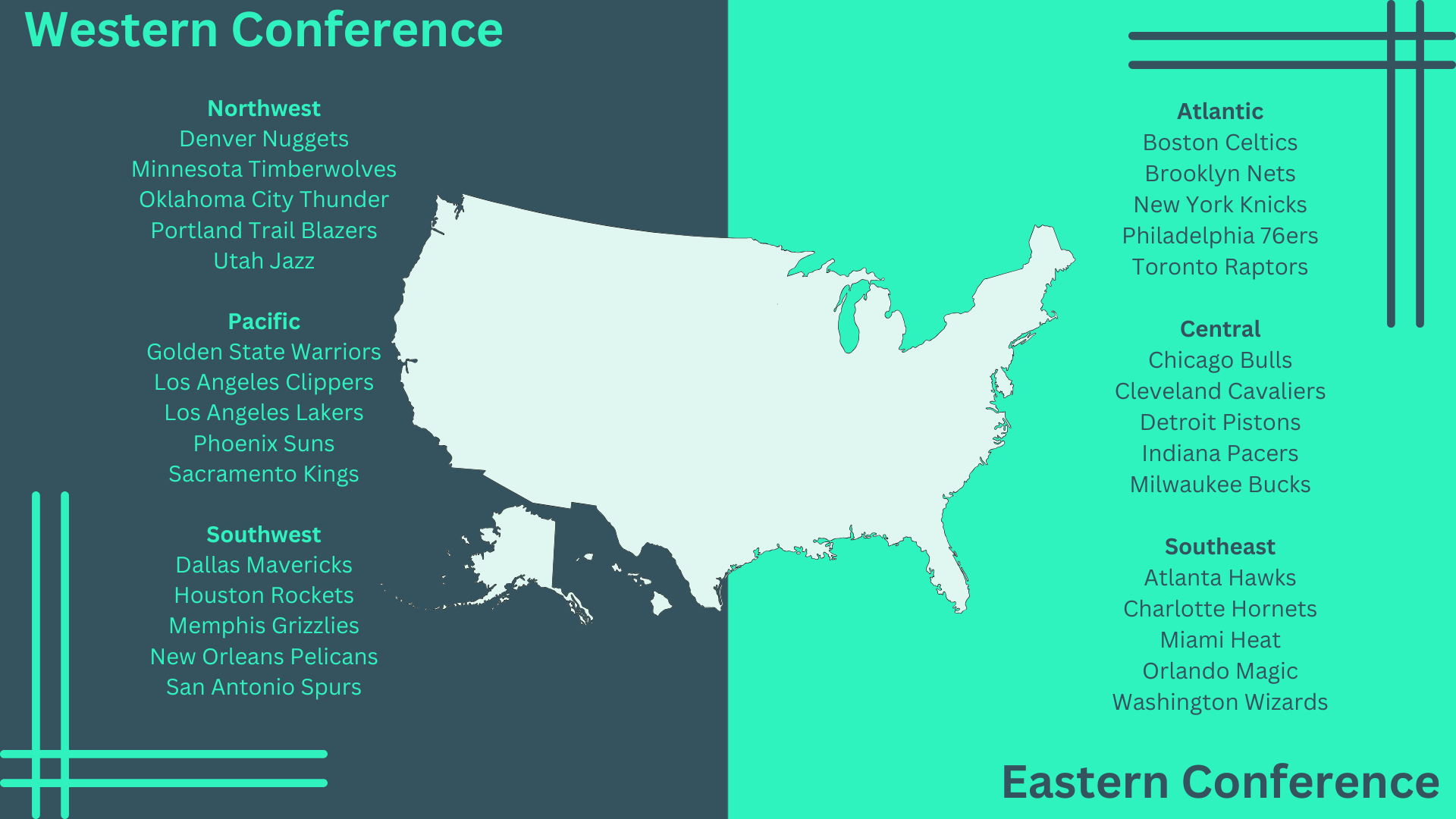
During the season, which begins in October, each team will play a total of 82 games (41 home, 41 away). A team will play the other members of its division four times, other teams from its conference three or four times, and all the teams in the other conference twice each.
In April, the NBA playoffs begin, with the top eight teams in each conference competing for the league championship title - the Larry O’Brien Championship Trophy. Each team plays an opponent in a best of seven series, with the first team to win four games advancing to the next round.
The final playoff is known as the NBA Finals, and is held in June (occasionally beginning in late May). The winner receives the trophy, and the league also awards the Bill Russell NBA Finals Most Valuable Player Award to the best player of the series.
Another major event on the basketball calendar is the All-Stars Game. This takes place in February (during a pause in the regular season), and fans vote for the best players in the league.
The one-off game showcases 24 of the league’s star players, captained by the players who achieved the highest number of votes from each conference.
To keep the game competitive, teams play for a charity of their choice, and there are also a number of other novelty contests (e.g. the Slam Dunk contest, which calls for players to dunk the ball in the most entertaining way).
A Quick Rundown Of Basketball Rules
Most of us understand the absolute basics of basketball well enough - players compete to score by throwing the ball through the baskets at each end of the court, and aren’t allowed to run with the ball - but if you’re not a basketball fan, the complexities of the rules may be a bit baffling.
We won’t go into the finer points of the game, but we’ll do a quick summary of the most significant rules so that you never feel completely at sea when talking about basketball.
Scoring
There are three ways to score points in basketball:
- A team receives three points for a goal scored from outside the three-point line
- A team receives two points for a goal scored from inside the three-point line
- A team receives one point for a goal scored from a free shot awarded due to a foul
Gameplay
- There are a maximum of five players per team
- The ball can only travel through passing or dribbling
- Once a player has two hands on the ball (not counting initially catching it), they can no longer dribble and must either pass or shoot
- An attacking team has 24 seconds from taking possession of the ball to take a shot at the basket
- After a team scores, possession is returned to the opposition
- If a team regains possession of the ball in their own half, they have just ten seconds to get it into their opponent’s end to avoid a foul
- Fouls are a major part of the game. Various types of foul can result in free throws, and if a team accumulates a certain number of fouls (usually more than four) their opponents receive a free throw for every subsequent foul
- Player substitutions can be made freely - at any time, and with no restriction on the number of substitutions
Betting On Basketball
Basketball is considered something of a niche market for sports betting in the UK, despite its popularity worldwide.
The majority of bookies will offer it, and most will have a reasonable range of markets available, but it’s certainly not going to be their main focus.
You will see basketball promotions fairly frequently, as bookies are often quite keen to encourage their customers to expand their betting activity to less popular sports.
It can therefore be useful for matched bettors to be comfortable betting on basketball if they want to be able to take full advantage of the offers available to them.
We’ll take a look at some of the most common markets available for an upcoming game between the Toronto Raptors and the Boston Celtics.
Common markets
- Moneyline. Unhelpfully, a bet on the winner of a match has the same name as the American odds format, which can be somewhat confusing for British newcomers to basketball betting. This bet includes overtime, and thus cannot be a draw.

- Handicap. For a full explanation of handicap betting in the NBA check out our dedicated article, but for our purposes here it’s enough to know that it works like a handicap market on any other sport. One team is assigned a theoretical points deficit, and must win by at least that amount for your bet to win. This evens up the odds in especially one-sided matches, making either option more worth betting on.

- Total Points. An over/under market on the total number of points scored in the game.

- Player markets. You’ll probably be confronted with a vast range of player markets (a portion of which are shown below), which include their number of steals, blocks, assists, rebounds, points scored, three-pointers, and so on.
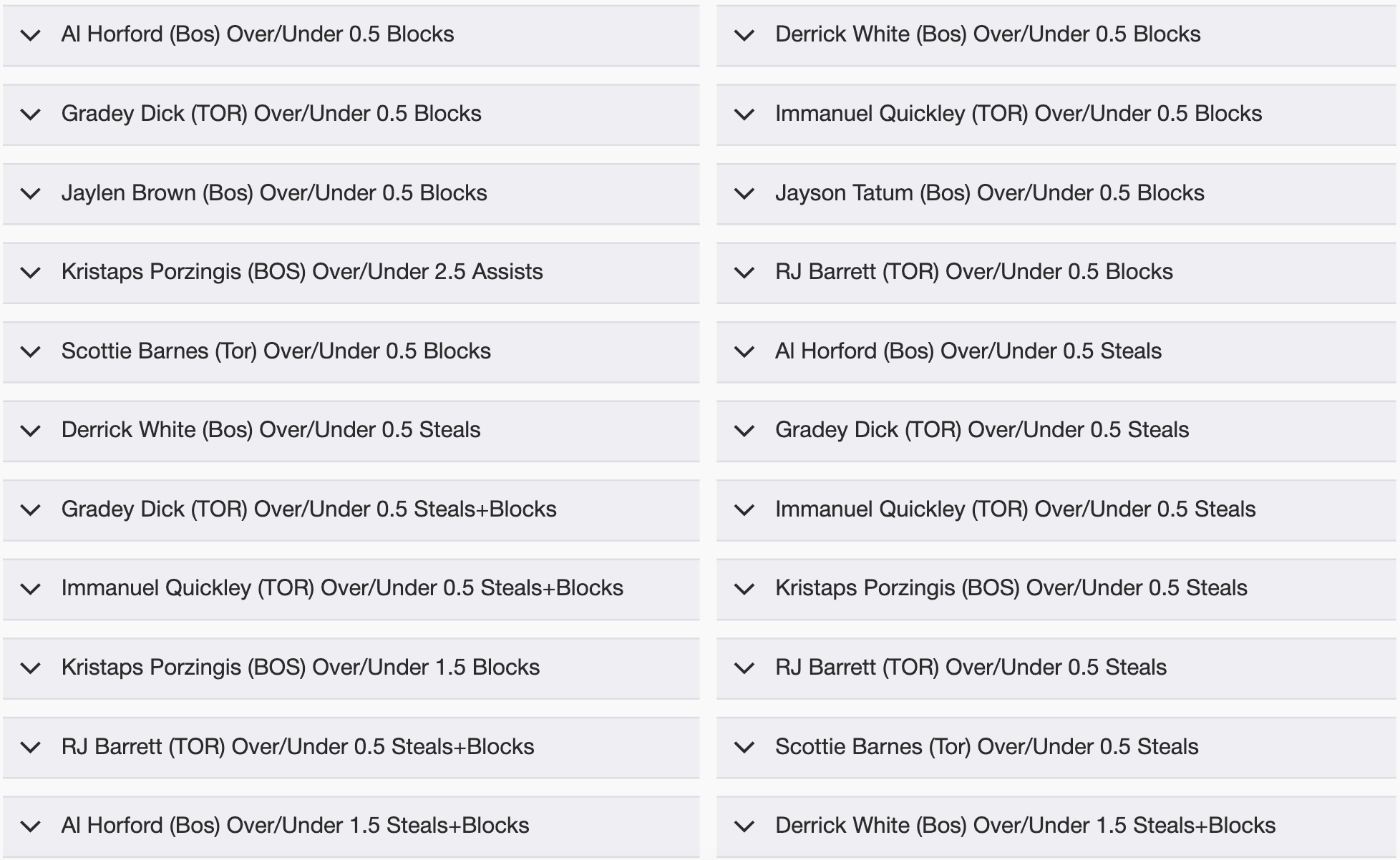
- Outright. A straightforward bet on the outright winner of a competition - the NBA finals, usually, for NBA betting.
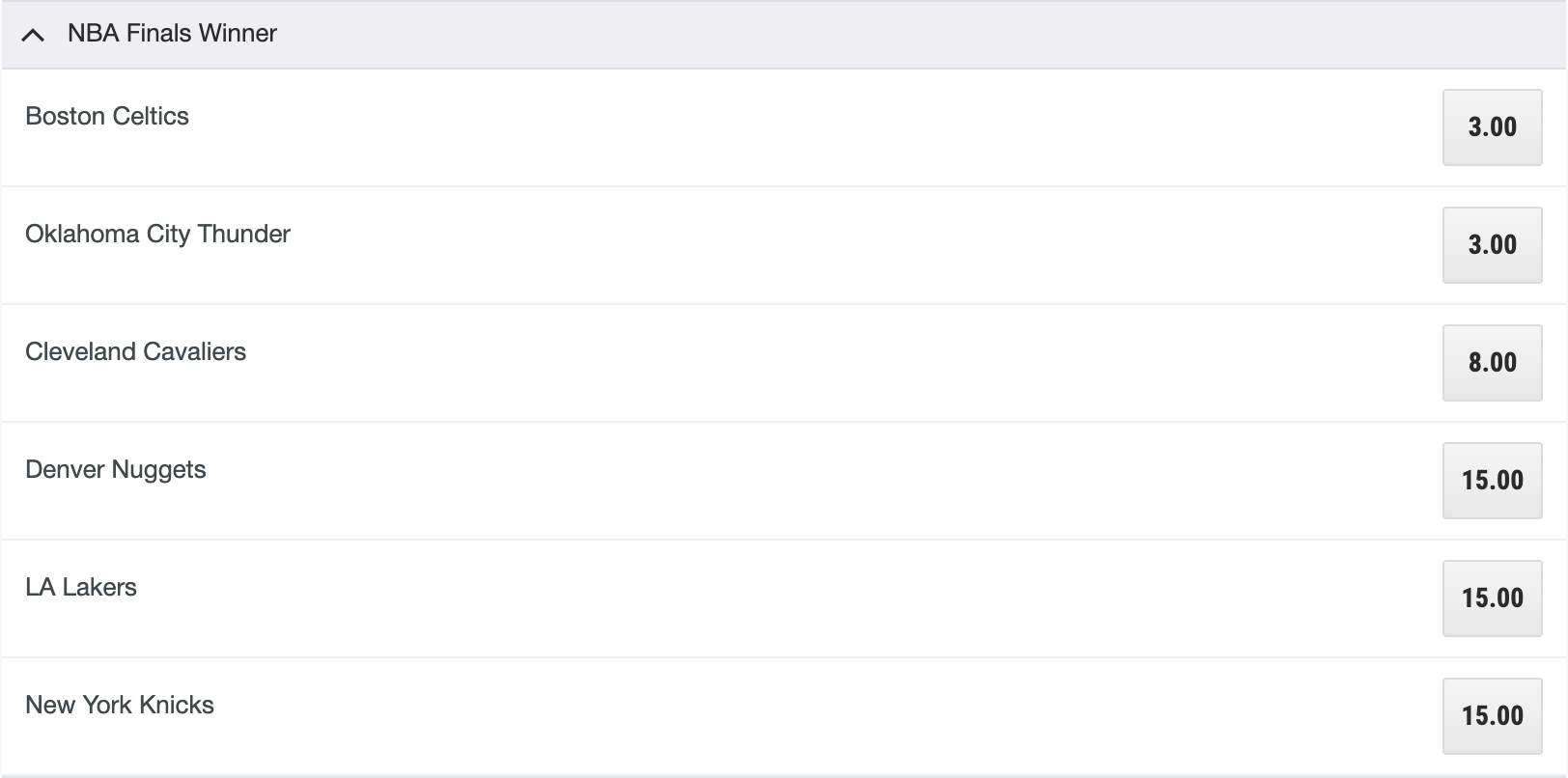
Spreads in basketball
It’s worth touching on the concept of ‘spreads’ in basketball, because it’s something that confuses a lot of British bettors.
In American sports, betting on ‘the spread’ means making a handicap bet - they’re exactly the same thing.
Some British bookies list spread markets for basketball (and other American sports), as we can see with William Hill below:

But many choose to refer to them as handicap markets, as we’ve seen earlier in this article, to remain consistent with other sports. This also avoids anyone mixing basketball spread markets up with the British concept of spread betting, which is something else entirely.
So long as you remember that handicap and spread markets are the same thing when it comes to basketball, you won’t go far wrong!
Strategies For Successful NBA Betting
For most people keen to start betting on basketball, their biggest question will be how to stand the best chance of making a profit.
As with any kind of sports betting, there’s always a risk involved, and you should be very wary of diving in without putting proper thought into the matter. Emotional or uninformed betting is an excellent way to lose money rapidly.
Always do your research before you bet on any sport. You can’t rely on bookie odds to tell you how likely an outcome actually is - their odds are determined by profit almost as much as by a team’s chances.
Performing your own independent research gives you a better chance of identifying a team’s real chances of winning - and also allows you to assess for yourself the value of the odds you’re seeing.
Consider team/player statistics and past performance. If you can identify a clear pattern of a particular player being crucial to a team’s success, it may be profitable to place a bet on that player to score a certain number of points and for their team to win.
This gets you better odds than a simple moneyline bet on the team in question, without much increasing your risk.
Handicap betting is popular with bettors in many sports, and can be useful when betting on a favourite in particular. If you’re confident a team is likely to win by a significant margin, betting on a handicap allows you access to far better odds than a simple moneyline bet.
If you bet outright on a future market - for example, on a particular team to win the NBA Finals - you may also get an opportunity to hedge your bet, depending on how the season goes.
If you’ve placed a bet on an underdog early on, and they do unexpectedly well, you could end up in a position to bet on their opponents and guarantee yourself a profit - or at least significantly reduce your potential loss.
Value betting, meanwhile, can offer you excellent opportunities to make a profit if you’re able to track down high value bets. One way of doing this is through Outplayed’s Steam Chaser tool, which locates over-valued bets, giving you the opportunity to capitalise on those high odds to make huge profits.
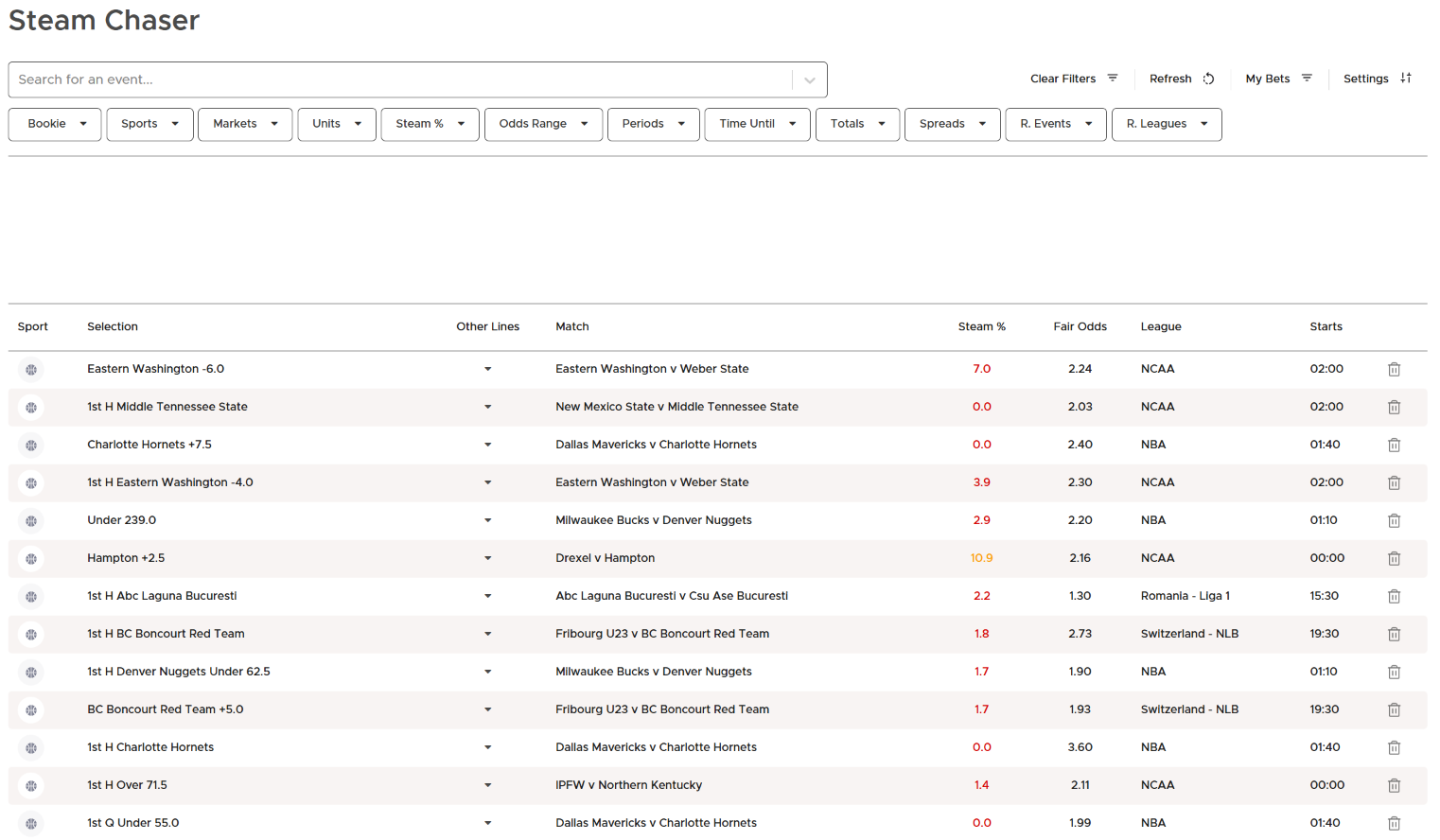
Whatever your strategy, you should always be careful with your betting. Never stake more than you can afford to lose, and if you feel yourself falling prey to unhealthy gambling habits, stop immediately and seek help.
Matched Betting And Basketball
An alternative to traditional sports betting strategies - which are rarely as reliable as you’d like - is Matched Betting, which guarantees you a profit so long as you do it right.
Matched Betting is the strategy of betting both for and against the same outcome. So for example, you might bet that the Boston Celtics win their upcoming game, and also that they don’t win.
You make your profit by combining this technique with the many promotions bookies offer to lure new customers. For example, you might see an offer where you have to place a £10 bet (known as a qualifying bet) to receive a £10 free bet.
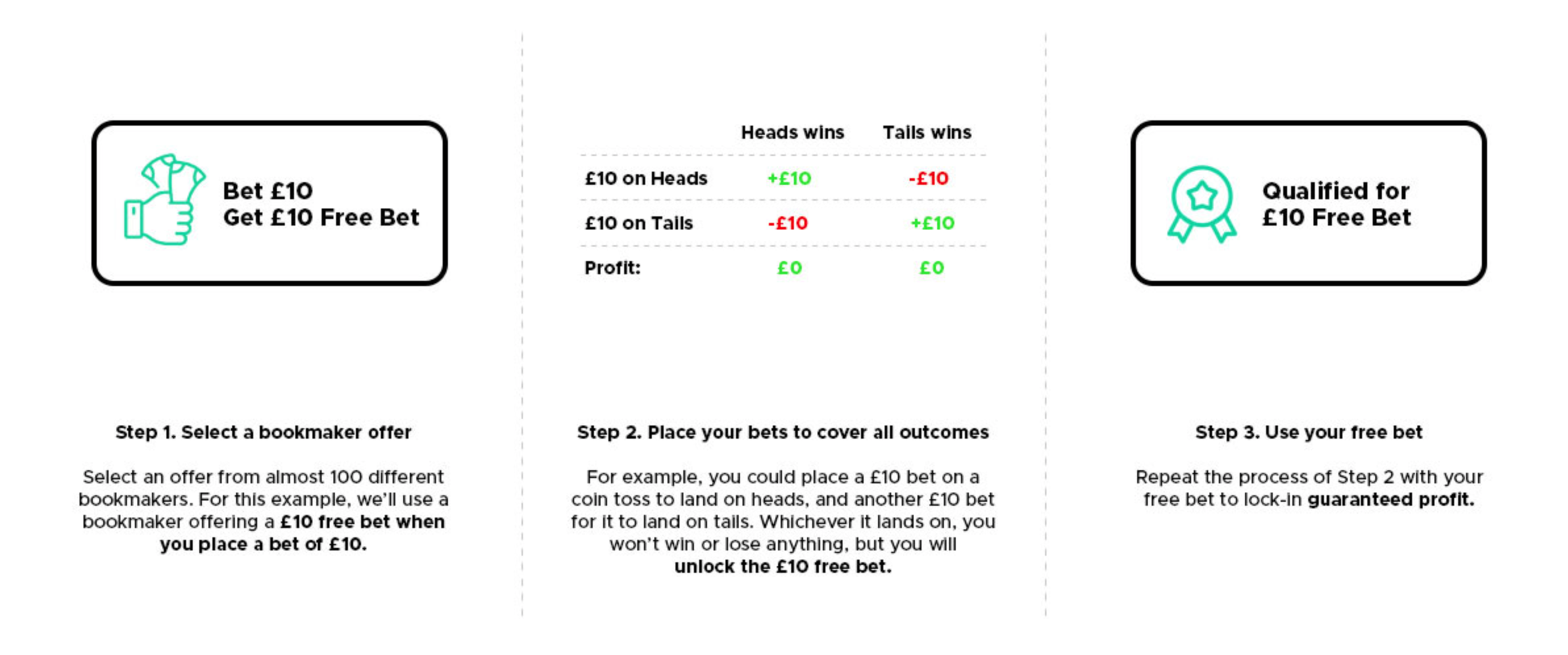
If you match both bets, you can roughly break even on the first bet, and then use your free bet to make a profit. Between sign up offers and reload offers, you can make £300 - £1000+ a month. A few people even make a living this way!
As basketball is a more niche sport in the UK, you don’t tend to see as many promotions as with other sports. However, bookies will also run promotions specifically designed to get punters betting on less popular sports, so if you’re comfortable Matched Betting on basketball, these can be a great way to profit.
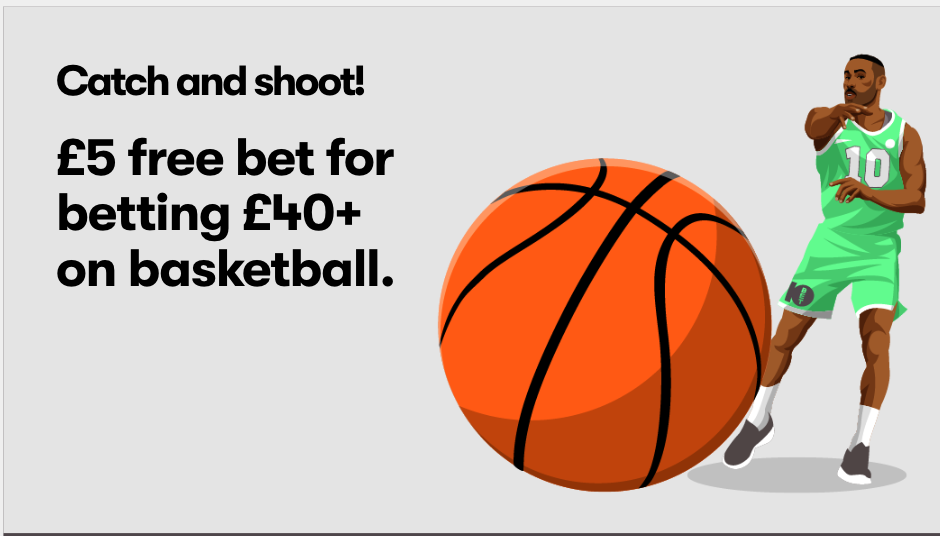
Summary
As the NBA grows in popularity worldwide, it’s logical to expect that betting on it will do the same, even in the UK, where we’re generally far more interested in football and horse racing.
For the savvy sports bettor, there are great opportunities to profit from basketball games, especially through Matched Betting.
And if you’re interested in finding out more about how you can use this technique to make your own profits, check out our beginner’s guide to Matched Betting. It takes you through everything you need to know to get started - or alternatively, you can take out our free trial and make your first profits today!
Updated: 5 Jan 2026
The Author
Stephanie is a published author and, having taken up Matched Betting fairly recently, she knows exactly how beginners feel when they first start Matched Betting. She loves breaking down complex subjects in straightforward terms to make them accessible to newcomers, and to speed them on their way to making their first profits.

